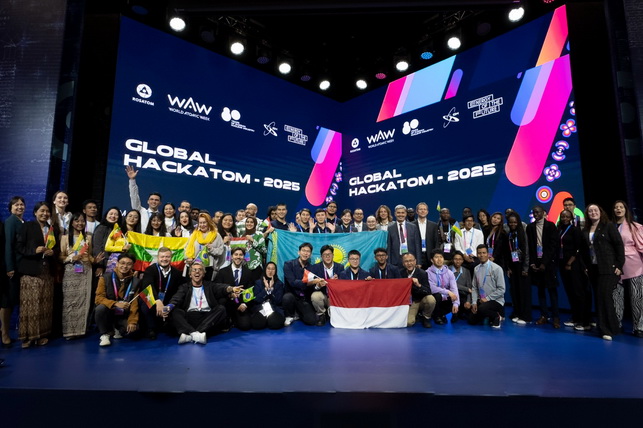
Students from Uzbekistan Present “Cosmic Silk Road” Project at Global HackAtom International Championship
Students from Uzbekistan Present “Cosmic Silk Road” Project at Global HackAtom International Championship
Tashkent, Uzbekistan (UzDaily.com) — The final of the international student championship Global HackAtom concluded in Moscow. The event was held as part of the youth program of World Atomic Week, supported by the state corporation Rosatom.
The competition brought together more than 50 finalists from ten countries. Among the participants was a team of students from the Tashkent branch of the National Research Nuclear University MEPhI (TF NRNU MEPhI), who presented a visionary project titled “Cosmic Silk Road 2100.”
The theme of the final focused on space exploration using nuclear technologies. Participants were tasked with developing, within 24 hours, a concept for applying nuclear technologies to space exploration by the year 2100.
The jury included representatives from Rosatom, the Russian Knowledge Society, astronomy popularizers, and faculty from specialized engineering universities. Teams proposed solutions for interplanetary travel, the construction of the first space-based nuclear power plant, and the creation of the “Cosmic Silk Road 2100.”
“Our team presented a rather ambitious project. We explored the development of nuclear technologies over the next 75 years and proposed our version of a cosmic silk road. The idea involved colonizing first the Moon, then Mars. In our project, nuclear technologies are used not only for energy generation but also, for example, to irradiate seeds so that plants can adapt to lunar or Martian soil. We demonstrated that nuclear technology can induce controlled mutations in seeds, helping them adapt to extraterrestrial environments,” said Emil Gariev, captain of the Uzbek team and a third-year student at TF NRNU MEPhI.
Participants noted that the final was a true test of rapid thinking, creativity, and teamwork. Within a single day, students were required not only to develop a scientific concept but also to prepare a presentation, calculate technical parameters, and defend their project in English before an international jury.
According to the team’s mentor, Shokhmirzo Umarov, the finalist teams demonstrated high levels of preparation, creativity, and systematic thinking. The Uzbekistan team performed admirably, receiving positive feedback from experts and participants from other countries. Most importantly, the students showed determination, confidence, and effective teamwork.
“For our team, participating in Global HackAtom was primarily a valuable educational and cultural experience. The final brought together 10 teams from 10 countries. It was especially rewarding to see our team members actively networking and exchanging ideas with representatives from other countries. Moments like this make it clear that the nuclear industry is not only about science but also about a community of like-minded people striving to build the future together,” Umarov noted.
The winner of Global HackAtom was the TUPI Tech team from Brazil, with a project on a modular nuclear reactor to support space exploration and resource supply for interplanetary missions. The second place went to the Tahu Sumedang team from Indonesia, which proposed using nuclear technologies to maintain circadian rhythms on long-duration space flights. Third place was awarded to the IsotopeX team from Hungary for a nuclear power source project to monitor fluid delays and vital signs in sleeping individuals during space travel.
For young innovators from Uzbekistan, participation in Global HackAtom was not just a competition but a step toward new scientific horizons. The students emphasized that international projects and competitions of this level facilitate knowledge exchange and help cultivate a generation of engineers and researchers ready to face the challenges of the 21st century.
“The most important thing Global HackAtom gave the participants was experience—specifically, the chance to see how teams from different educational systems think and present, learn to showcase their ideas on an international stage, and, most importantly, gain confidence by overcoming fears and doubts. I am certain that this experience will accompany them throughout their professional lives. With these students, nothing is impossible,” said mentor Shokhmirzo Umarov.
Global HackAtom is an international student championship in which participants seek solutions to real-world challenges in the nuclear industry within 24 hours. In 2025, national stages were held in 10 countries, including Uzbekistan, with over 650 students from 160 teams taking part. The final in Moscow was supported by Rosatom and formed part of the anniversary events marking the 80th year of Russia’s nuclear industry.